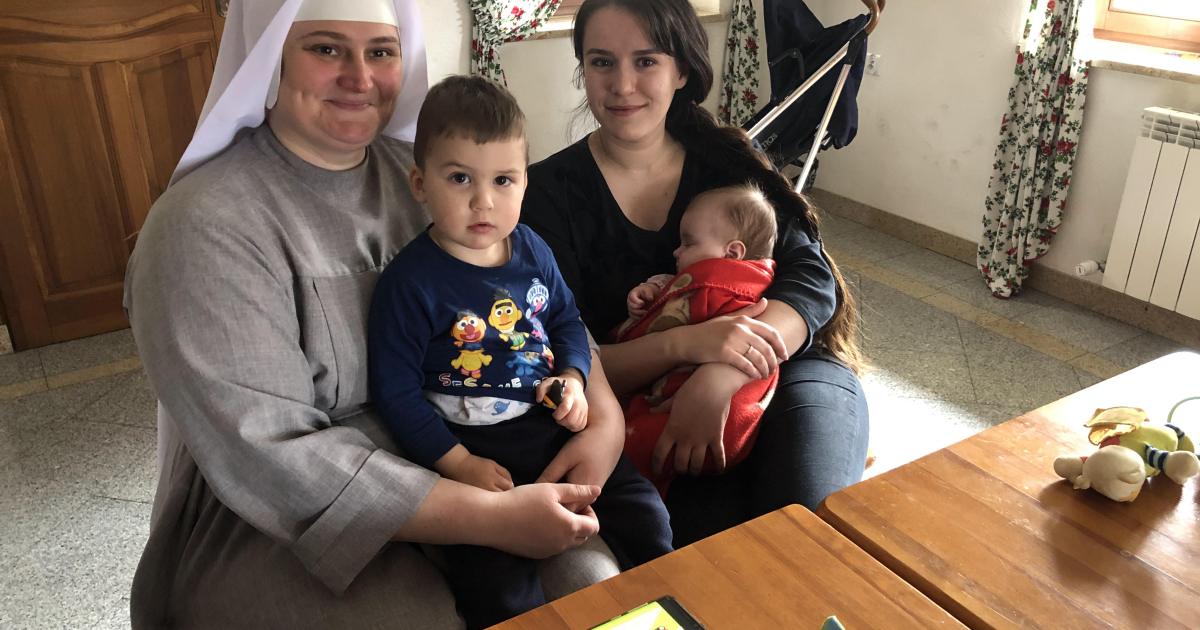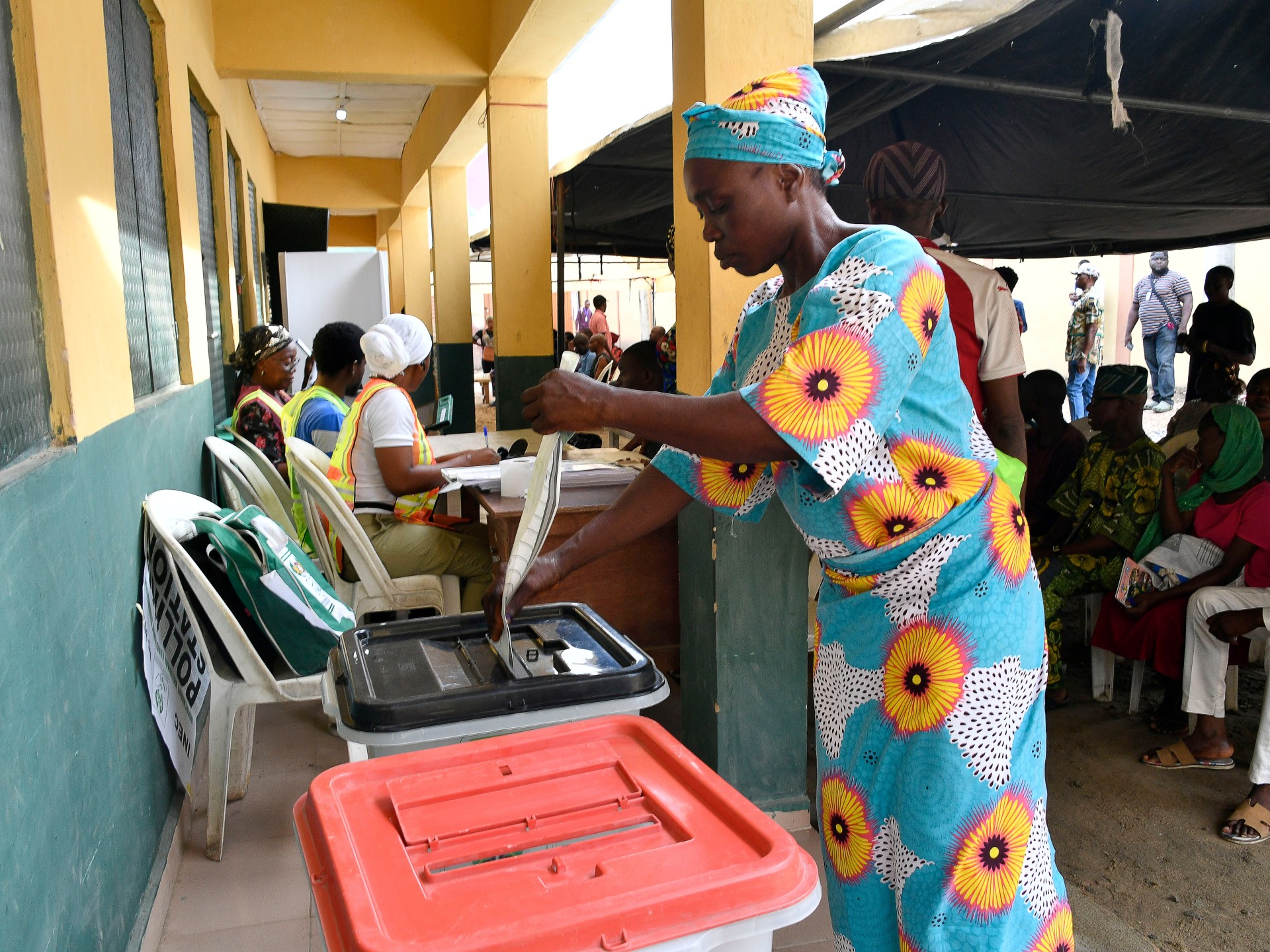A room of their own: The lives of Ukrainian women refugees
“Women’s war has its own colours, its own smells, its own lighting, and its own range of feelings. There are no heroes and incredible feats, there are simply people who are busy doing inhumanly human things.”
– Svetlana Alexievich, The Unwomanly Face of War
By now, ski season is over in the picturesque town of Zakopane in the south of Poland. The lifts that transport thousands of alpine skiers each year to the foothills of the Tatras Mountains have ground to a halt, dangling eerily in the frosty air. The trees are still mostly bare and flowerless even though it is already April. But this winter has been unusually long – and it is accompanied by the unrelenting bitterness of a war raging 250km (155 miles) away.
In early March, days after the Russian invasion of Ukraine, the first refugees started arriving. They were exhausted, having travelled for days in freezing temperatures, barely stopping to rest at makeshift shelters in Polish border towns. Through word-of-mouth, they had found out about three holiday homes in Zakopane, owned by the family of 38-year-old Weronika Łukaszayk. “I have five siblings with whom I run these guesthouses. We decided to cease the bulk of our business to host fleeing Ukrainians,” says Łukaszayk, a lawyer specialising in civil disputes. “Now, some of our neighbours who heard about what we’re doing are also opening their homes to refugees. It’s very good to see.”
Over the next month, the rooms filled up quickly. Now, 52 people – all women and children from different parts of Ukraine – occupy the three houses, each of which is half a minute’s walk from the other two. The houses are structurally almost identical, with four floors and a loft.
In a matter of weeks, the refugees have had to learn how to live together in an arrangement that they hope is temporary, supporting one another while grappling with the shared pain of displacement. Their children attend school in the town centre, which is a short drive away. Grocery shopping is done at a small local store just down the hill, aptly called Brutal Market. Its logo is that of a terrified ladybug trying to escape a clenched fist.
This is a record of the stories of several Ukrainian women who have sought refuge at these holiday homes. But it also bears witness to the talk, the activity, the tragedy and the warmth that collectively form the memories of the three households as they are being made.
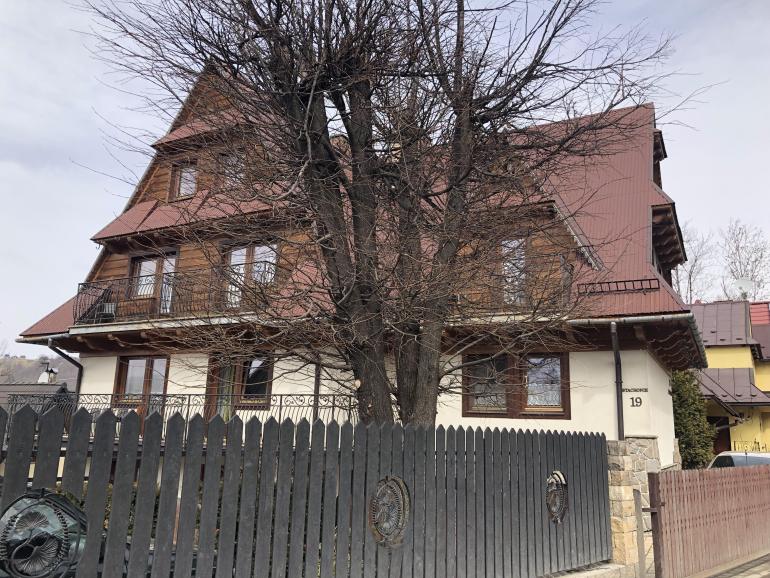
Inside the first home
Room 22
Years of tireless labour earned 36-year-old Lesya Grichuk her own slice of paradise in the north of Ukraine, about 80km (50 miles) from the Belarusian border. Grichuk and her husband Anatoly had met while studying at a college in Irpin, a city 20km (12 miles) northwest of Kyiv. “Back then I was penniless – my father died suddenly in a car crash. My grandmother took over ownership of the house and turned us out,” she recalls. Jovial and warm, Lesya is most likely to be found in the communal areas of the house, looking after the younger children or making tea for the other women.
After a failed attempt to move to Belarus, Lesya and Anatoly heard about the tiny village of Buda, where there was a house cheaply available. There was only one other home in the vicinity. The Grichuks were enthralled by the pristine beauty of their new neighbourhood. “We always knew we wanted to raise our children in nature,” Lesya tells me. For two decades, she and Anatoly grew crops and reared their own animals for food, occasionally hunting for additional meat. Anatoly worked as a truck driver previously but gave it up as the job took him away from home for long stretches of time. “I missed him a lot. I told him that I don’t need a lot of money. Just to be together is a luxury,” Lesya says.
Her oldest sons Daniil, 17, and Kirill, 14, are in Ukraine along with their father, supporting him as he joins the Territorial Defence Forces like millions of other men between the ages of 18 and 60. There have been reports that teenagers just a year or two older than Daniil are being sent to the frontline after just a few days of basic training. Lesya and her other four children, Kostya, 12, Angelina, 10, Zakhar, 7, and Olena, 4, stayed for as long as they could before leaving for Poland on March 24, when the shelling around their home began to intensify. Years ago, Daniil had gone on an exchange programme to Switzerland for Ukrainian children from financially underprivileged backgrounds and had stayed in touch with his host family. They told him about a house in Zakopane that was hosting Ukrainian refugees, and he urged his mother and siblings to head there.
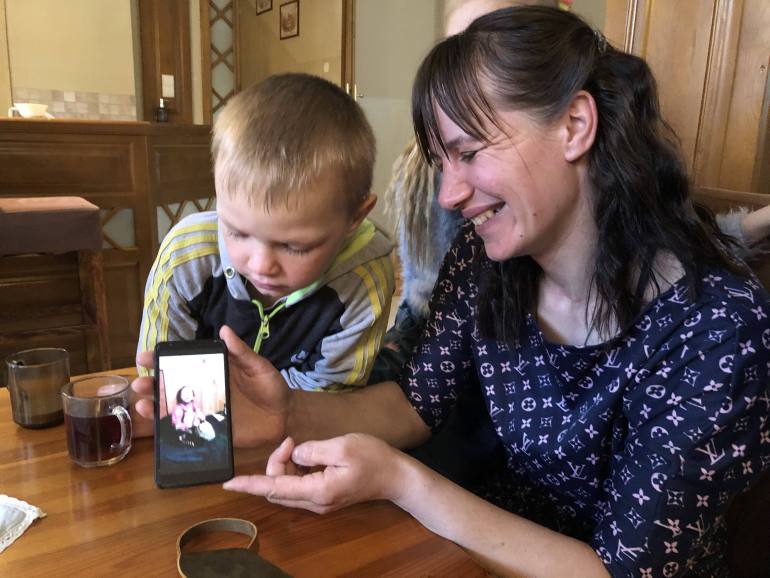
The Grichuks brought little with them. Lesya’s most prized possession is her phone, which allows her to call her husband and two sons. It also contains pictures and photos of her children feeding lambs, growing juniper shrubs, and singing while horse riding.
Angelina and Kostya are going to the local school in Zakopane, although there are some teething problems with their foray into the Polish education system. Angelina was entered at a lower grade than in Ukraine, and she says she has already learned most of the material being taught. “I’m happy there’s very little homework here,” Kostya says with a cheeky grin.
In their free time, the Grichuks play together in the garden and prepare meals in the kitchen on the ground floor along with the other refugee families. “I’m always telling the children that we’re not at home, we’re only guests, and we need to be careful with people’s things,” Lesya says. Her eyes well up with tears when she talks about the life she is so proud of having built for herself and her family. “I try not to cry. I tell the children that they’re safe, and that at least we’ll go home one day. I love Ukraine, I really do.”
The family’s room is on the top floor of the house, which is connected to an attic. Angelina and Kostya are thrilled by the slanted roof above their beds, and it is a perpetual source of amusement for them.
On cold nights, Lesya likes to stand on the balcony and gaze out onto the majestic peaks of the Carpathian range. If she closes her eyes, she can almost believe she is back home in Buda, watching the last snowfall of the year.
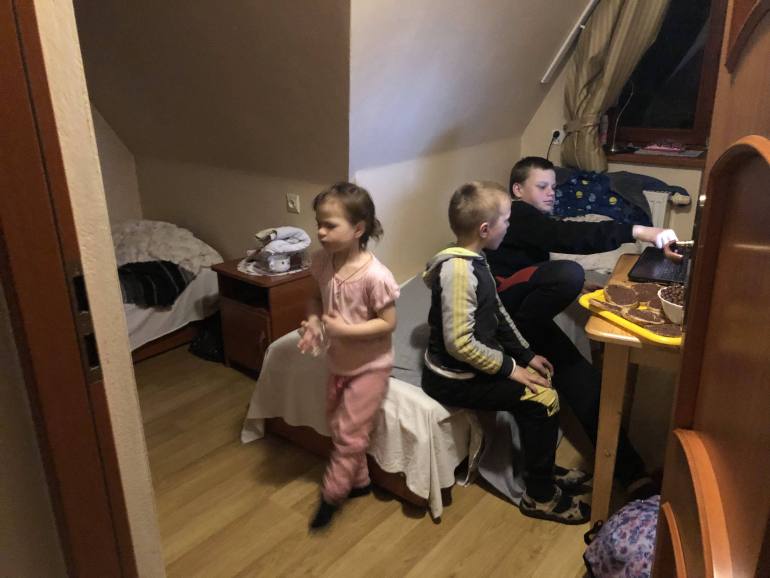
The games room
When school finishes for the day, the children excitedly spill into the games room. An afternoon of billiards, cards and toys awaits them. Weronika Łukaszayk’s niece, a toddler who looks about three or four, prattles on in Polish to Olena Grichuk, who is about the same age. Despite not being able to understand each other’s language, the two children carry on playing merrily. Next to the billiards table, the women of the house chat over cups of tea.
Mia, a little white dog that belongs to a family from Dnipropetrovsk in central Ukraine, pads around the room sniffing at everyone’s heels. She has recently been shaved so her appearance is comical, with a large fluffy head juxtaposed against thin legs. From time to time, one of the children picks her up and gives her a cuddle.
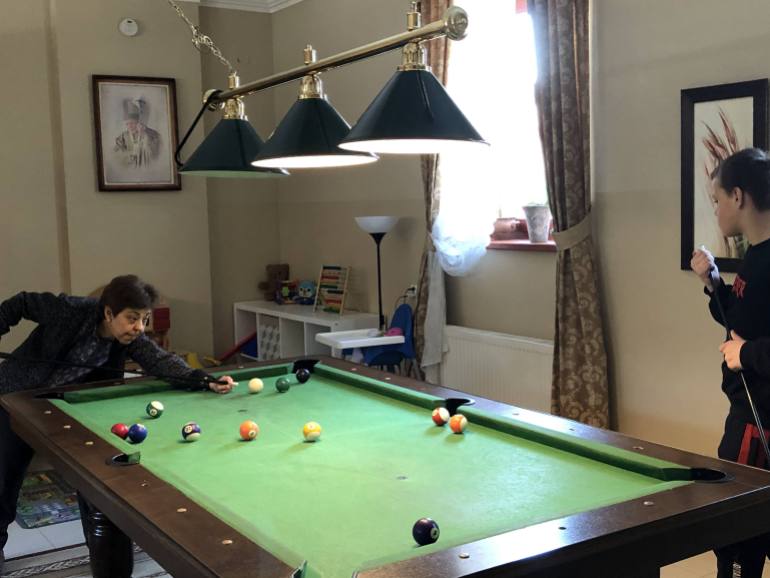
Room 1
Iryna Melnyk, 40, is in an odd situation. On March 6, along with her daughters Anna, 16, and Marharyta, 7, she fled her home in Khmelnytskyi in western Ukraine for the safety of Warsaw, where one of her aunts has been staying for many years. Less than a month later, as a psychiatrist by training, she is in Zakopane, offering counselling sessions to the Ukrainian women living in the three houses. She will just be here for a few days but she can already tell that some of them are struggling with the shock and trauma of the war. “But they’re really strong, and I know they’ll manage,” she says.
She exudes a resolute calm that is soothing for the women that she meets, but she has not been able herself to process the events of the last few weeks. Her own experience has allowed her to connect powerfully with the women. “Polish people have been really kind to us, but even then, they can’t fully understand what’s going on, because it hasn’t happened to them. When I listen to these women, I see myself in their shoes. I have to try to be a doctor to them, not a friend,” she says.
Her own future is uncertain. To continue practising as a psychiatrist in Poland, she has to apply for a professional licence, for which she must attain a certain level of proficiency in Polish. “I hope that the government here will create a system that makes it easier for me to work here. There is so much to do, and plenty of vulnerable women and children from Ukraine really need mental health support,” she explains. Days after we met, the Polish health minister, Adam Niedzielski, announced in a press conference in Wrocław that employment procedures would be simplified for medical staff from Ukraine who are seeking refuge in the country. Poland’s healthcare system has been severely understaffed for decades – a problem exacerbated by the pandemic – and there are suggestions that Ukrainian nurses and doctors could fill the gap.
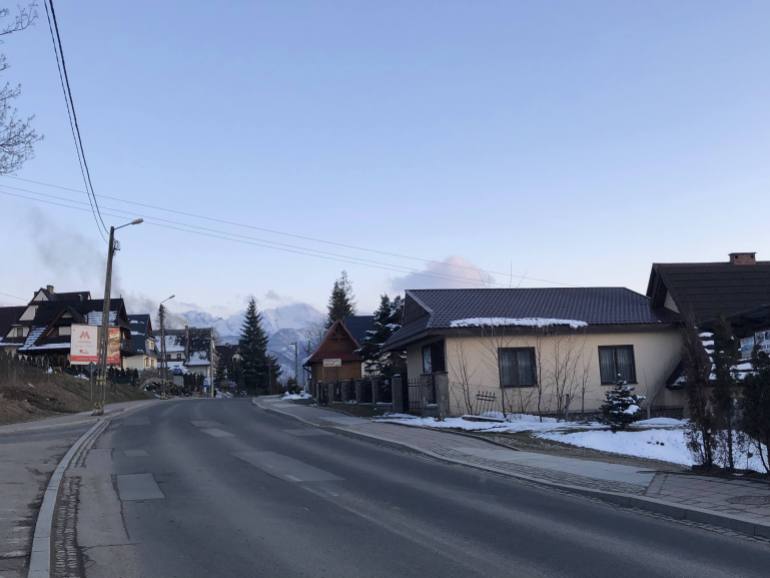
Life in Ukraine had not been a bed of roses for Iryna. For 12 years, she had worked at a hospital where the salaries were poor and the hours were unforgiving; the average monthly salary of physicians in Ukraine is 54,000 hryvnias ($1,800). After Marharyta was born, she turned her interest in cosmetology into a side gig, opening a small clinic where she offered skincare treatments. Her husband Vasily, 38, her college sweetheart whom she married in their fourth year of medical school, had also made the switch early on to work in the pharmaceutical industry instead, as there was more money in it than the medical profession. Together, both of them were able to eke out a more comfortable life for themselves and their daughters.
Iryna made up her mind to leave Ukraine on March 4 when she saw footage of the Zaporizhzhia nuclear plant – the largest in Europe – being attacked by Russia. “I was really scared it would be the next Chernobyl. I could not put my daughters through it,” she recalls. It took her 27 hours to arrive in Warsaw. Both her daughters are now enrolled in school and are adjusting fairly well to studying in a foreign country.
Over the last month, she has met with other women in Warsaw who approached her for counselling. Usually, they find her through word of mouth. Several are terrified that their daily existence is precarious and hinges upon the generosity of the Polish state, which may run dry one day.
I ask Iryna about her own emotional response to the war. Her self-possession wavers for a fraction of a second. With sadness in her voice, she says, “For a long time, I dreamt of coming to Europe. In the last few weeks, I finally got to explore Warsaw. It’s a beautiful city. But now that I’m here, I feel absolutely nothing.”
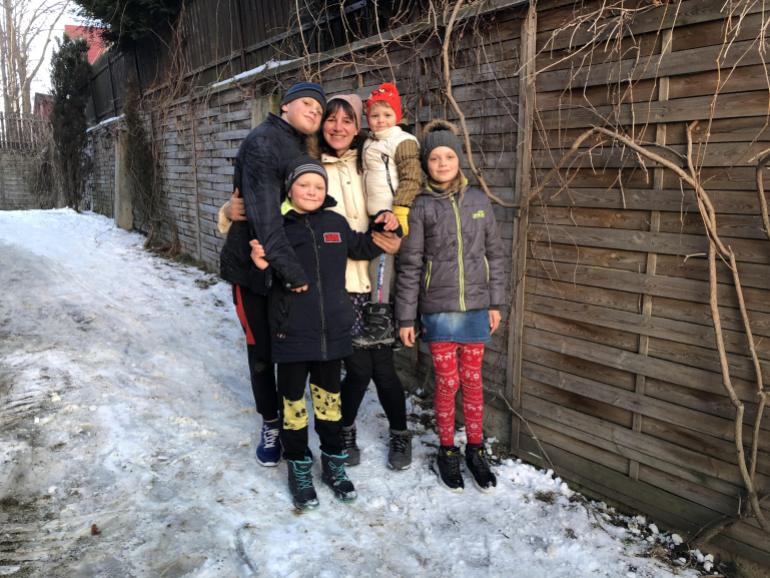
Inside the second home
Rooms 4 and 5
Fresh-faced and with her hair pulled back in a thick braid, 21-year-old Diana Oliynyk looks serene as she wraps her dozing infant daughter in a warm blanket. Yeva is just five months old, born shortly before the war. “I knew we had to move,” Diana says. “We heard about places all around our home that were being bombed.” As she gently rocks Yeva to sleep, her son Marko, 2, totters around the room, pulling open drawers and peering inside them to see if he can find any toys.
Diana is from Miakoty, a village with little more than 1,000 residents located in western Ukraine. She ran a hair salon from her apartment, and business was brisk. “I started by giving discounts to my friends whenever I cut their hair. When they realised that I was quite good at it, they referred me to other people they knew,” she says. Along with her husband Mykhaylo, 22, a builder and mechanic, Diana was saving up to buy a bigger house for her expanding family. Now their plans have been thwarted.
In the months prior to the war, she had also taken an interest in environmental justice. “I was thinking of setting up a waste recycling business in our area. It’s not just eco-friendly, there’s good money in it. But I just have to wait, and hope there’s still an opportunity in the future for me to do it,” she says with a smile.
The house has 16 occupants in total, and 14 are members of Diana’s family. The woman she calls her mother-in-law, Monika Chernyeska, 37, is a Benedictine nun who took Mykhaylo into her care when he was little. He was one of 11 children that Monika adopted from orphanages all around Ukraine. The rest of the children have gone to school, leaving Yeva and Marko – who are too young – at home. Rosy-cheeked Monika busies herself in the kitchen, preparing borscht and cake in anticipation of many hungry stomachs when the children come home from school.
“I always felt that it was my calling to look after as many children as I could,” Monika explains as she sits down for a quick breather. “Mykhaylo is my oldest son. Some of the children’s biological parents are still alive, but may have problems like alcoholism and drug addiction. It’s their choice whether or not they want to be in touch with their parents. My role is to help them grow up in a loving family.”
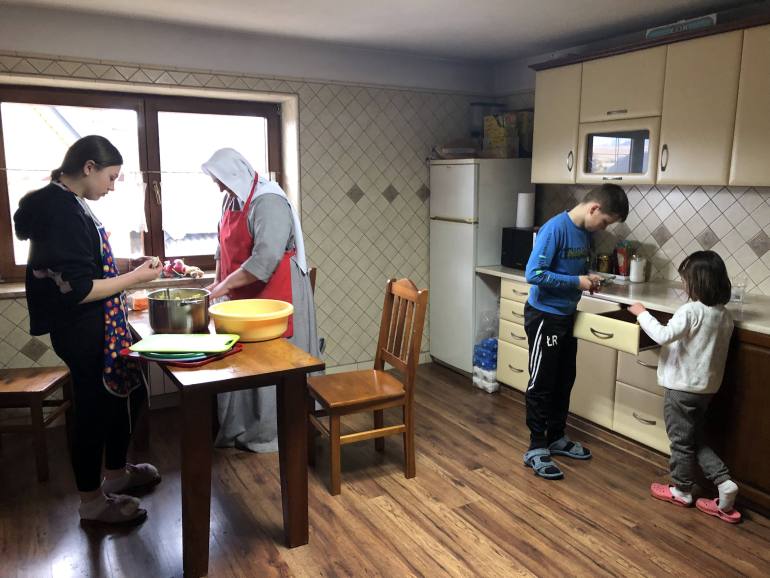
As a nun, Monika is of modest means. Her sole income came from making souvenirs and sweets for religious celebrations. With 11 children to care for, she sought financial assistance from Catholic organisations from all over the world. She managed to cobble together roughly 100,000 hryvnias ($3,300) every month to cover the family’s expenses. The monastery where she lived also provided her with some funding to restore a derelict house in the town of Bilohirya, a short 33km (20 miles) away from the apartment that Diana and Mykhaylo moved to after they got married. Until the war, Monika had been living in this house with Mykhaylo’s foster siblings.
The day the war started – February 24 – was also her birthday. “We were just 50km (31 miles) away from where some of the fighting was taking place,” she says. “We didn’t see any bombs falling, but we saw the planes and tanks.” She immediately contacted some priests in Poland whom she knew, and they rapidly made arrangements to receive her family. Another Benedictine monk offered to drive all of them – including Diana and her two children – to the Polish border. They arrived in Zakopane on March 4, tired and disoriented.
Monika has only condemnation for the Russian army. “The things they’re doing are horrible, they’re not human. And as for Putin, I’m sure ordinary citizens are scared of him after years of totalitarianism. But they must know that blood is also partly on their hands,” she says.
For now, Monika and Diana take heart in the idea that the war will not last forever and in the sanguine prospect of being reunited with their families soon. Diana worries about Mykhaylo and her mother, who chose to remain in Miakoty. “I’ve asked the local kindergarten if I can work there as an assistant,” Monika says. “I speak Polish, Russian and Ukrainian. I want to make myself useful.”
The dining room
At 4:30pm on Tuesdays, the dining room is a hive of activity. Jadniga Trebunia, a teacher from Poronin, a town that is a 12-minute drive away from Zakopane, is here to deliver a Polish language lesson to the children in the house. The adult occupants of the other two houses are also encouraged to attend.
“I’ve never done anything like this before,” Jadniga admits as she pulls a stack of Polish textbooks and worksheets out of her bag to distribute to the eight children who are here for her class. “But I think it’s really important for them to learn Polish, it will make it easier for them to get used to living here,” she adds. As a friend of the family that owns the three houses, Jadniga was more than happy to support the refugees’ cultural integration. Today, one of the mothers from the house next door has also chosen to attend.
“Repeat after me now,” Jadniga says as she pins to the wall a large sheet of paper where she has scrawled Polish verb conjugations. The children dutifully take notes and imitate her pronunciation of the words. In the adjacent kitchen, dinner is being prepared by Monika; the scent of buttery mashed potatoes wafts into the room.
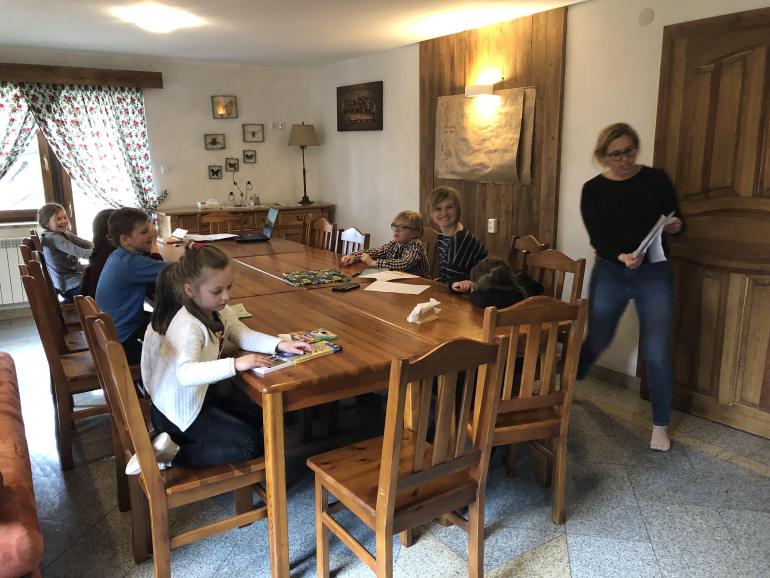
Room unknown
Conflict is like a curse that has followed 41-year-old Iryna Lipkova for the last 10 years. Her family is from Luhansk, now one of the country’s most embattled regions, ripped apart by war since 2014. In 2012, Iryna moved to Kyiv for a few years before getting married and settling down in Irpin. There, she worked as a maths teacher in a primary school.
At 9am on March 6, a huge blast reverberated outside Iryna’s apartment. Hurriedly filling some bags with their clothes, she and her daughter Nadiya, 6, headed with their neighbour to the central train station in Irpin by minibus. The bus ride there was nerve-racking. “The driver kept swerving because of the shooting,” she remembers. They arrived at the station to find that it was also in a state of pandemonium. People had been waiting on the platform for hours, only to be told that the trains might not depart because of damage to the tracks caused by shelling.
Iryna and Nadiya were forced to flee on foot. Their belongings were too cumbersome to lug along, so they abandoned them at the train station. As gunfire rattled around them, they carefully made their way across a bridge linking Irpin and Kyiv, which had been demolished by the Ukrainian army to slow the Russian advance. “Soldiers helped us carry our things over this makeshift walkway,” Iryna says. Thousands of others were with them, many completely incapacitated by distress and grief. From Kyiv, Iryna and Nadiya immediately took a train to Lviv, the largest city in western Ukraine which, at that point, had been free from heavy bombardment. “We stayed with my relatives for one night, and the next morning they drove us to the Polish border,” Iryna says. On the car ride there, a colleague from her school got in touch to tell her about the house in Zakopane. It took another day to get to the house, with the help of volunteer drivers in Krakow.
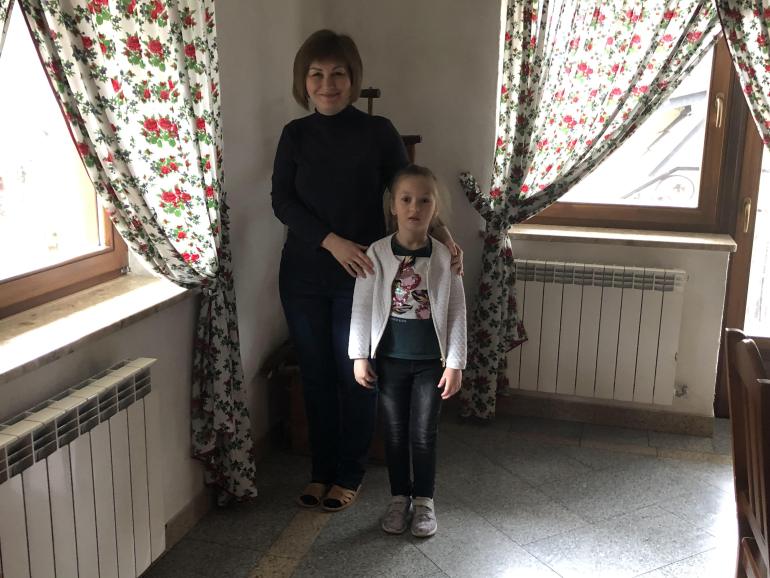
Nadiya is also going to school like the other children, but she is more reserved than usual. “She understands that there is a war, and that’s why we’re here,” Iryna says. It has been difficult for Iryna to continue teaching her students online, with Irpin being at the forefront of Russia’s most brutal assaults. Every day, she waits in trepidation for a call from her husband Yevgenii, who also fled Irpin for Lviv a few days after she did, waiting for the violence to subside.
Iryna misses reading – her favourite author is Stephen King – but she brought no books and finds it hard to focus anyway. “I don’t know my room number here, I just go straight in,” she says expressionlessly.
Inside the third home
Rooms 8 and 9
When it comes to domestic chores, 27-year-old Lyudmila Sydor is like a fish out of water. She dreads her turn on the cleaning roster, which the women jointly came up with. “I miss working with heavy machines,” Lyudmila says, her stern demeanour giving way to the smallest of smiles. She shows me photos and videos of herself at work. Her phone contains footage of her mixing concrete in a barrel. In another picture, she is driving a truck with her 10-month-old son Matviy on her lap and her two-year-old daughter Zlata seated next to her. She finds it hard to contain her deep passion for gruelling labour and while she will soon start working as a waitress at the McDonald’s in Zakopane, Lyudmila would much rather be on a construction site, doing what she loves.
Lyudmila and her husband ran a company supplying building materials to businesses and individuals in the western Ukrainian city of Ternopil. They regularly worked from 8am to 1am in busy periods, and one of Lyudmila’s favourite tasks was driving the truck to deliver concrete slabs to her customers. “We were just doing well enough to hire four other workers,” she says.
Ternopil has remained unscathed from the relentless shelling sustained by other parts of Ukraine. Still, Lyudmila felt it was best to go somewhere safer because of her home’s proximity to an army barracks, a prime target for the Russians. She drove her family – including her mother Olha, 50, sisters Ulyana and Nadezhda, 16 and 10, and her two children – across the border to Poland. Aside from her husband, Lyudmila left behind two brothers: 23-year-old Volodymyr, who lives with a disability, and 19-year-old Oleh, who was initially conscripted to join the army but is now on leave. “The sounds from the bombing caused a lot of problems with his head,” Lyudmila says, alluding to a deteriorating mental health issue. Oleh also has a wife who is pregnant.
Her daughter Zlata has not taken well at all to her new environment, crying often and waking every few hours from nightmares.
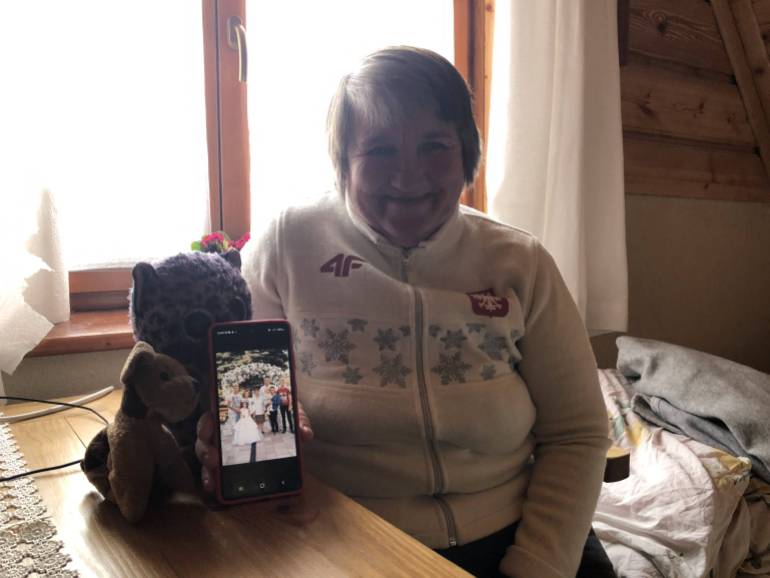
The Sydor family shares two rooms on the top floor of the house. Olha spends her time caring for her grandchildren and her youngest daughter Nadezhda. Sweet-natured and softly spoken, Olha has known hardship for most of her life. The war is merely the latest episode in the series of misfortunes that have plagued her.
She was raised in a type of orphanage in the city of Zalishchyky known as an internat – a type of boarding school where children with various disabilities can live and study, with the option to visit their homes over the weekends. Although she was told by teachers that she had a mild intellectual disability, she never found out what it was.
Many of the children, like Olha, were not in fact orphans. Their parents were alive but were mired in substance abuse or were in a constant state of inebriation – meaning that the state often intervened to place these children under its care. “Some of my classmates did get to go home on Sunday. I really wanted to have somewhere to go, but I didn’t know my family,” Olha says.
The internat may have a notoriously deplorable reputation in Ukraine, with many such institutions accused of abusing children in their care, but Olha says she was lucky: “We got books, sweets, and clothes.” When she was eight, she wrote a letter to a particularly benevolent teacher, requesting help in locating her birth parents. The teacher succeeded in tracking down her parents. Olha sought out her mother but was so appalled by her alcoholism that she decided not to pursue a relationship with her.
With few employment prospects after leaving school, Olha took a job as a cleaner. She could barely make ends meet, and her ex-husband – Lyudmila’s father – was himself a heavy drinker. Volodymyr, Oleh and Lyudmila were all given up to an orphanage for several months at various points. “I worked very, very hard to earn enough to get them back,” Olha says.
She is eager to share anecdotes from her life, clicking her tongue impatiently whenever a photo will not load on her phone due to the poor connection in her room. On the table next to the bed, she keeps a small stuffed toy dog, one of the most precious objects she took with her when she fled. “This is a lucky charm from my grandmother,” she says.
Soon, Nadezhda will return from school, and Olha cannot wait to hug her. “I’ve never had much education,” she says shyly. “I can’t teach my children well, so the only thing I can do is give them all the love they deserve.”

Room 3
Two floors below the Sydors lives Anna Karpovna Polachek, 80, who everyone affectionately calls “babka”, or “grandmother”. She is the oldest person in all three houses. A wizened woman who is often wrapped in shawls and sweaters, Polachek has been reflecting on the irony of having her childhood and old age marked by carnage. “I can’t believe I have to move even though I am already so old,” she says melancholically.
She was born into chaos, spending her infancy in a trench dug by her mother and a group of other women in an attempt to hide from the Nazis as they invaded Ukraine during WWII. When she was just 12, she went to work on a Soviet sovkhoz – a state-owned farm – to support her mother, who had been critically injured in the war. “I milked the cows, did all kinds of agricultural labour, and eventually went to work in a factory,” she says.
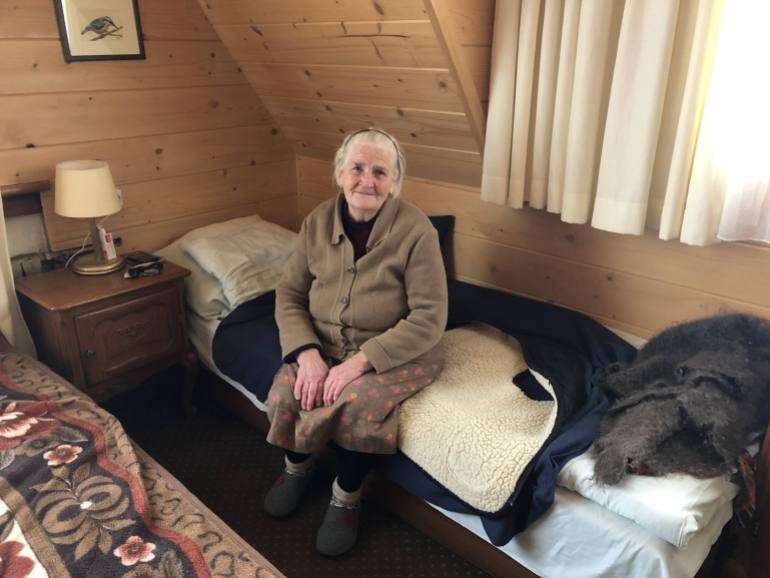
In March, the city where she lived, Zhytomyr, endured air and missile raids that destroyed residential buildings and caused severe damage to a thermal electricity plant and two hospitals. Along with two of her daughters, Natalya and Svetlana, Anna made up her mind to leave. They first stayed in Lviv, then entered a Polish town with a name she does not remember. There, they slept in a hangar that had been repurposed to house refugees before Natalya found a volunteer who directed them to the house in Zakopane.
Anna sobs uncontrollably when she talks about her 28-year-old grandson, Sergiy, who has epilepsy and schizophrenia, and lives in a facility for people with a mental illness in Ukraine. “I really wish he could have just come with us,” she says.
She ambles slowly up the stairs to show me her room. Among her scant possessions are her passport, a small cupboard full of medication for high blood pressure, and some wool blankets. “This is all we have now,” she says. As I bid her goodbye, she clutches my hands and starts crying again. “Girl, you are young,” she says. “I hope you have a very good life. May God bless you, and may you never have to live through this.”

